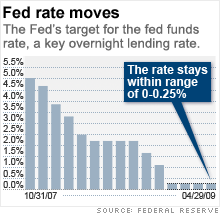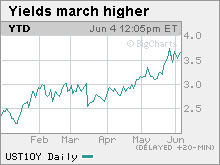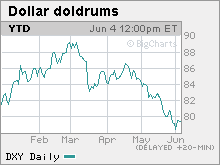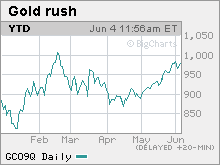Revenge of the inflation hawks
Even though hyperinflation is unlikely, Ben Bernanke would be foolish to ignore the inflation warning bells that the markets and other Fed members are sounding.


 |
| Even though the Fed has bought long-term Treasurys, the yield on the benchmark 10-year keeps moving up. Click the chart for more bond rates. |
 |
| In another sign of inlfation, the dollar has plummeted against a basket of other currencies in recent weeks. Click the chart for more exchange rates. |
NEW YORK (CNNMoney.com) -- Is the Federal Reserve concerned about inflation? It depends on which member of the central bank you ask.
Fed chairman Ben Bernanke grabbed the lion's share of attention Wednesday when talking to Congress about the state of the economy and the federal budget.
Bernanke, in testimony to the House Committee on the Budget, warned that "the country's fiscal problems will require a willingness to make difficult choices" and added that the big question confronting the nation "is how large a share of the nation's economic resources to devote to federal government programs."
But at the same time, Bernanke dismissed the notion that people should be worried about inflation -- even though the Fed has kept its key interest rate near zero since December and has been responsible for pumping trillions of dollars into the economy with various initiatives geared toward keeping the banking system and credit markets afloat.
"In this environment, we anticipate that inflation will remain low," Bernanke said, adding that despite "recent increases in the prices of oil and other commodities, cost pressures generally remain subdued."
But not everyone at the Fed shares such a sanguine view about inflation. In fact, several of the Fed's more hawkish (i.e. more concerned about inflation) members are starting to worry about inevitable pricing pressures that could arise from the easy money environment fostered by the Fed right now.
And they're not keeping quiet about it either.
Thomas Hoenig, president of the Federal Reserve Bank of Kansas City, said in a speech in Sheridan, Wyo., Wednesday that "it is clear that interest rates must rise" and added that "the current level of monetary accommodation will need to be withdrawn to avoid introducing inflationary impulses."
Translation: Even though the Fed's policy-making committee has been saying repeatedly since December that rates will probably remain "exceptionally low...for an extended period," Hoenig apparently thinks the Fed shouldn't keep rates at zero that much longer.
Hoenig has often served as a more populist voice of reason on the Fed. He's been a vocal critic of the notion that some financial firms were "too big to fail" even as the central bank and other regulators issued hundreds of billions of dollars in loans and loan guarantees to prop up AIG (AIG, Fortune 500), Bank of America (BAC, Fortune 500) and Citigroup (C, Fortune 500).
Talkback: Is Ben Bernanke wrong to dismiss inflation concerns? Leave your comments at the bottom of this story.
Hoenig has no say this year on what the Fed decides to do about interest rates. He's currently an alternate member of the Fed's Open Market Committee. But his views on inflation are important since the Kansas City Fed chief is due to be a voting member of the FOMC in 2010.
Jeff Lacker, the president of the Federal Reserve Bank of Richmond and current FOMC member, has also started to express concerns about keeping rates low indefinitely.
In a speech last month in Washington, Lacker conceded that he thinks inflation will likely be stable in the near-term. But he added that the combination of ultra-low rates and the massive expansion of the Fed's balance sheet are "inflation risks that are quite legitimate."
"The danger is that [the FOMC] will not shrink our balance sheet and tighten policy soon enough when the recovery emerges to prevent rising inflation," he said. "Choosing the right time to withdraw that stimulus will be a challenge, and I believe it will be very important to avoid the risks of waiting too long or moving too slowly."
Now some would argue that the Fed shouldn't have a tough time keeping inflation in check. After all, if the economic recovery that investors believe is in the cards is actually unfolding, all the central bank has to do is raise rates and unwind lending programs like the Term Asset-Backed Securities Loan Facility (TALF) that are injecting liquidity into the credit markets.
But it may not be that simple. Hoenig warned in his speech that the economy may recover more gradually than people are hoping it will. And if that is true, he predicted that there will be "considerable pressure on the central bank to 'help out'...by keeping interest rates low for an extended period."
Another Fed member known for his hawkishness, Federal Reserve Bank of Dallas president Richard Fisher, shares this concern. Fisher acknowledged in a speech in Washington last week that some Fed critics are worried the central bank could be fanning inflation flames instead of trying to put them out in order to boost the speed of the recovery.
To that end, the Fed announced in March that it would begin buying long-term Treasurys in an attempt to keep mortgage rates relatively low. Fisher said this decision "has been viewed by some as skating a little too close to the edge of political accommodation."
He added that the Fed "can ill afford to be perceived as monetizing debt, lest we come to be viewed as an agent of, rather than an independent guardian against, future inflation." (Fisher was a voting member on the Fed in 2008)
Don't get me wrong. Hoenig, Lacker and Fisher are not calling for the Fed to dramatically hike interest rates and nip the recovery in the bud. And few are predicting that the Fed is going to create another housing bubble if it keeps rates low for much longer or that a new era of hyperinflation will soon be upon us.
Still, while a little bit of inflation is good for the economy -- shrinking prices, or deflation, tends to grind economic activity to a halt -- Hoenig astutely pointed out Wednesday that inflation, if unchecked, could have far worse consequences for many consumers than a long period of slow growth would.
"Inflation is the least fair, most regressive and most corrosive tax we can impose on ourselves. It is particularly harsh for low-to-moderate income citizens," he said in his speech.
And the apparent disconnect between what Bernanke is telling Congress (Inflation? Forget about it?) and Hoenig (Get ready for inflation soon if we're not careful) is a real concern.
It's not just a matter of wonky academic debate between two ivory tower economists. The market's getting involved as well and it's clearly siding with Hoenig.
Despite the Fed's purchase of Treasurys, that hasn't been enough to counteract the glut of new debt being foisted onto the market. As a result, there has been a sell-off in long-term bonds since March, pushing their yields from 2.5% to about 3.7% in the process.
Bond rates move in opposite direction to prices, and rising yields are often a sign of inflation concerns. What's more, the dollar is currently trading near its lowest level of the year against a basket of other currencies, most notably the euro. A weak greenback is another factor that can lead to inflation.
Finally, the price of gold has surged in recent weeks and is getting close to $1,000 an ounce again. Gold often rallies when investors are worried about inflation, since this tangible asset is viewed as a good hedge against rising prices.
So with all due respect to the Fed chair, he can talk as much as he wants about how he's not too worried about inflation. But investors disagree. And Hoenig thinks that the Fed would be unwise to dismiss what's going on with bond rates, currencies and commodities.
"The markets won't be fooled by artificially low rates for long," Hoenig said. "We are experiencing the first signs of the markets' concerns in the rising rates and increased volatility in longer-term Treasury markets."
"I suggest strongly that we need to be alert to the markets' message and begin in earnest to bring monetary policy into better balance before inflation forces our hand," he concluded. Amen to that.
Talkback: Is Ben Bernanke wrong to dismiss inflation concerns? ![]()


